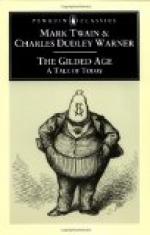“Morgen! Didn’t hear d’ drain oncet. Dem boys geeps me up zo spate. Gom right in.”
Philip was shown into a dirty bar-room. It was a small room, with a stove in the middle, set in a long shallow box of sand, for the benefit of the “spitters,” a bar across one end—a mere counter with a sliding glass-case behind it containing a few bottles having ambitious labels, and a wash-sink in one corner. On the walls were the bright yellow and black handbills of a traveling circus, with pictures of acrobats in human pyramids, horses flying in long leaps through the air, and sylph-like women in a paradisaic costume, balancing themselves upon the tips of their toes on the bare backs of frantic and plunging steeds, and kissing their hands to the spectators meanwhile.
As Philip did not desire a room at that hour, he was invited to wash himself at the nasty sink, a feat somewhat easier than drying his face, for the towel that hung in a roller over the sink was evidently as much a fixture as the sink itself, and belonged, like the suspended brush and comb, to the traveling public. Philip managed to complete his toilet by the use of his pocket-handkerchief, and declining the hospitality of the landlord, implied in the remark, “You won’d dake notin’?” he went into the open air to wait for breakfast.
The country he saw was wild but not picturesque. The mountain before him might be eight hundred feet high, and was only a portion of a long unbroken range, savagely wooded, which followed the stream. Behind the hotel, and across the brawling brook, was another level-topped, wooded range exactly like it. Ilium itself, seen at a glance, was old enough to be dilapidated, and if it had gained anything by being made a wood and water station of the new railroad, it was only a new sort of grime and rawness. P. Dusenheimer, standing in the door of his uninviting groggery, when the trains stopped for water; never received from the traveling public any patronage except facetious remarks upon his personal appearance. Perhaps a thousand times he had heard the remark, “Ilium fuit,” followed in most instances by a hail to himself as “AEneas,” with the inquiry “Where is old Anchises?” At first he had replied, “Dere ain’t no such man;” but irritated by its senseless repetition, he had latterly dropped into the formula of, “You be dam.”
Philip was recalled from the contemplation of Ilium by the rolling and growling of the gong within the hotel, the din and clamor increasing till the house was apparently unable to contain it; when it burst out of the front door and informed the world that breakfast was on the table.




